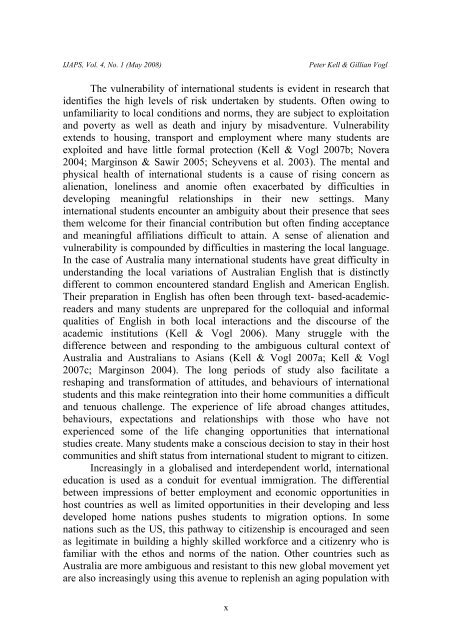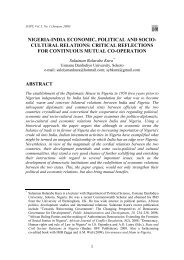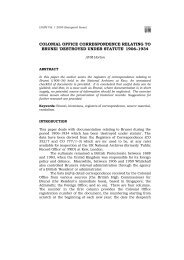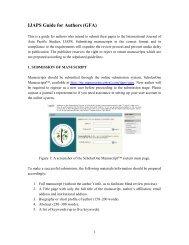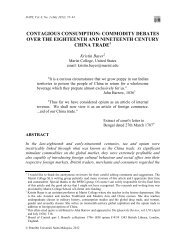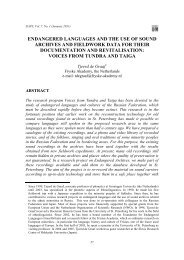This edition of the International Journal of Asia Pacific Studies ...
This edition of the International Journal of Asia Pacific Studies ...
This edition of the International Journal of Asia Pacific Studies ...
You also want an ePaper? Increase the reach of your titles
YUMPU automatically turns print PDFs into web optimized ePapers that Google loves.
IJAPS, Vol. 4, No. 1 (May 2008)Peter Kell & Gillian VoglThe vulnerability <strong>of</strong> international students is evident in research thatidentifies <strong>the</strong> high levels <strong>of</strong> risk undertaken by students. Often owing tounfamiliarity to local conditions and norms, <strong>the</strong>y are subject to exploitationand poverty as well as death and injury by misadventure. Vulnerabilityextends to housing, transport and employment where many students areexploited and have little formal protection (Kell & Vogl 2007b; Novera2004; Marginson & Sawir 2005; Scheyvens et al. 2003). The mental andphysical health <strong>of</strong> international students is a cause <strong>of</strong> rising concern asalienation, loneliness and anomie <strong>of</strong>ten exacerbated by difficulties indeveloping meaningful relationships in <strong>the</strong>ir new settings. Manyinternational students encounter an ambiguity about <strong>the</strong>ir presence that sees<strong>the</strong>m welcome for <strong>the</strong>ir financial contribution but <strong>of</strong>ten finding acceptanceand meaningful affiliations difficult to attain. A sense <strong>of</strong> alienation andvulnerability is compounded by difficulties in mastering <strong>the</strong> local language.In <strong>the</strong> case <strong>of</strong> Australia many international students have great difficulty inunderstanding <strong>the</strong> local variations <strong>of</strong> Australian English that is distinctlydifferent to common encountered standard English and American English.Their preparation in English has <strong>of</strong>ten been through text- based-academicreadersand many students are unprepared for <strong>the</strong> colloquial and informalqualities <strong>of</strong> English in both local interactions and <strong>the</strong> discourse <strong>of</strong> <strong>the</strong>academic institutions (Kell & Vogl 2006). Many struggle with <strong>the</strong>difference between and responding to <strong>the</strong> ambiguous cultural context <strong>of</strong>Australia and Australians to <strong>Asia</strong>ns (Kell & Vogl 2007a; Kell & Vogl2007c; Marginson 2004). The long periods <strong>of</strong> study also facilitate areshaping and transformation <strong>of</strong> attitudes, and behaviours <strong>of</strong> internationalstudents and this make reintegration into <strong>the</strong>ir home communities a difficultand tenuous challenge. The experience <strong>of</strong> life abroad changes attitudes,behaviours, expectations and relationships with those who have notexperienced some <strong>of</strong> <strong>the</strong> life changing opportunities that internationalstudies create. Many students make a conscious decision to stay in <strong>the</strong>ir hostcommunities and shift status from international student to migrant to citizen.Increasingly in a globalised and interdependent world, internationaleducation is used as a conduit for eventual immigration. The differentialbetween impressions <strong>of</strong> better employment and economic opportunities inhost countries as well as limited opportunities in <strong>the</strong>ir developing and lessdeveloped home nations pushes students to migration options. In somenations such as <strong>the</strong> US, this pathway to citizenship is encouraged and seenas legitimate in building a highly skilled workforce and a citizenry who isfamiliar with <strong>the</strong> ethos and norms <strong>of</strong> <strong>the</strong> nation. O<strong>the</strong>r countries such asAustralia are more ambiguous and resistant to this new global movement yetare also increasingly using this avenue to replenish an aging population withx


